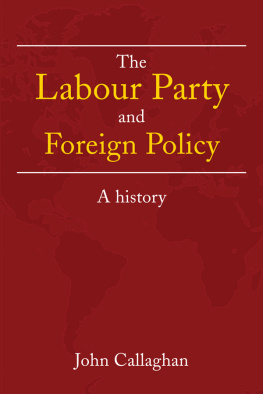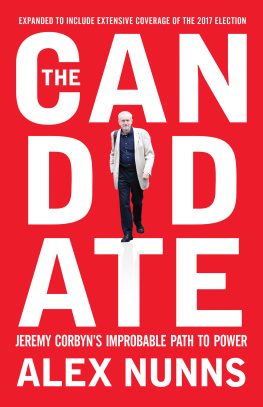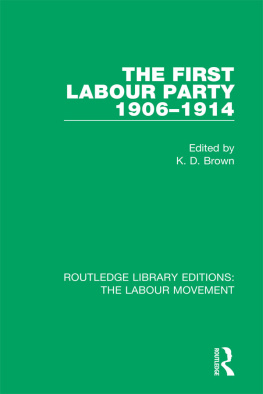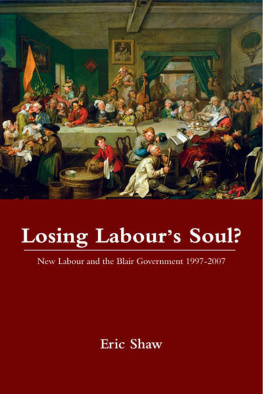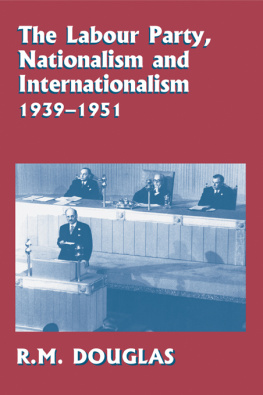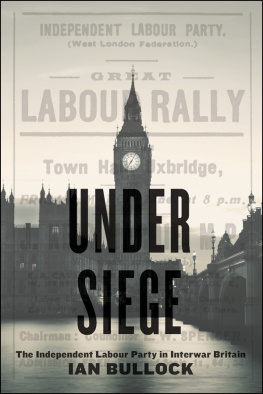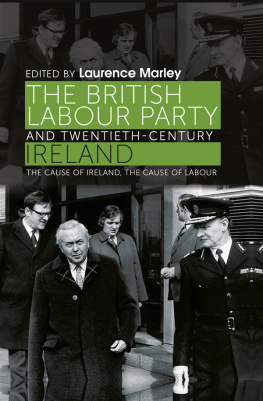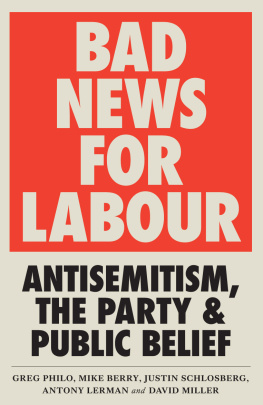Labour Party - The Labour Party and foreign policy: a history
Here you can read online Labour Party - The Labour Party and foreign policy: a history full text of the book (entire story) in english for free. Download pdf and epub, get meaning, cover and reviews about this ebook. City: London;Great Britain, year: 2007, publisher: Taylor & Francis (CAM);Routledge, genre: Politics. Description of the work, (preface) as well as reviews are available. Best literature library LitArk.com created for fans of good reading and offers a wide selection of genres:
Romance novel
Science fiction
Adventure
Detective
Science
History
Home and family
Prose
Art
Politics
Computer
Non-fiction
Religion
Business
Children
Humor
Choose a favorite category and find really read worthwhile books. Enjoy immersion in the world of imagination, feel the emotions of the characters or learn something new for yourself, make an fascinating discovery.
- Book:The Labour Party and foreign policy: a history
- Author:
- Publisher:Taylor & Francis (CAM);Routledge
- Genre:
- Year:2007
- City:London;Great Britain
- Rating:3 / 5
- Favourites:Add to favourites
- Your mark:
- 60
- 1
- 2
- 3
- 4
- 5
The Labour Party and foreign policy: a history: summary, description and annotation
We offer to read an annotation, description, summary or preface (depends on what the author of the book "The Labour Party and foreign policy: a history" wrote himself). If you haven't found the necessary information about the book — write in the comments, we will try to find it.
The Labour Party and foreign policy: a history — read online for free the complete book (whole text) full work
Below is the text of the book, divided by pages. System saving the place of the last page read, allows you to conveniently read the book "The Labour Party and foreign policy: a history" online for free, without having to search again every time where you left off. Put a bookmark, and you can go to the page where you finished reading at any time.
Font size:
Interval:
Bookmark:
The Labour Party and Foreign Policy
The foreign policy of the Labour Party is not only neglected in most histories of the party, it is also often considered in isolation from the partys origins, evolution and major domestic preoccupations. Yet nothing has been more divisive and more controversial in Labours history than the partys foreign and defence policies and their relationship to its domestic programme.
Much more has turned on this than the generation of tempestuous conference debates. Labours credentials as a credible prospect for Governmental office were thought to depend on a responsible approach to foreign and defence policy. Its exclusion from office was often said to stem from a failure to meet this test, as in the 1950s. The composition of LabourCabinets was powerfully influenced by foreign and defence considerations, as was the centralisation of power and decision-making within Labour Governments. The domestic achievements and failures of these periods in office were inextricably connected to international questions.
- But what did Labour have to offer on foreign policy?
- Did it subscribe to a different agenda and dissident values?
- Were its leaders more insightful than their political rivals?
- Did they hold Conservative Governments to account?
- Did Labour itself gradually adapt to power politics?
- Or does it retain a distinctive approach?
The Labour Party and Foreign Policy: A history provides a penetrating new study of the Labour Partys thinking on international relations, which probes the past, present and future of the partys approach to the international stage. This comprehensive and up-to-date book is recommended for undergraduate and postgraduate courses in British politics and European history.
John Callaghan is Professor of Politics at the University of Wolverhampton, UK.
The Labour Party and Foreign Policy
A history
John Callaghan

First published 2007
by Routledge
2 Park Square, Milton Park, Abingdon, Oxon OX14 4RN
Simultaneously published in the USA and Canada
by Routledge
270 Madison Avenue, New York, NY 10016
Routledge is an imprint of the Taylor & Francis Group, an informa business
2007 John Callaghan
All rights reserved. No part of this book may be reprinted or reproduced or utilised in any form or by any electronic, mechanical, or other means, now known or hereafter invented, including photocopying and recording, or in any information storage or retrieval system, without permission in writing from the publishers.
British Library Cataloguing in Publication Data
A catalogue record for this book is available from the British Library
Library of Congress Cataloging in Publication Data
Callaghan, John.
The Labour Party and foreign policy : a history / John Callaghan.
p. cm.
Includes bibliographical references and index.
1. Labour Party (Great Britain) History. 2. Great Britain
Foreign relations. I. Title.
JN1129.L32C27 2007
327.41dc22 | 2006032945 |
ISBN10: 0415246954 (hbk)
ISBN10: 0415246962 (pbk)
ISBN10: 0203647122 (ebk)
ISBN13: 9780415246958 (hbk)
ISBN13: 9780415246965 (pbk)
ISBN13: 9780203647127 (ebk)
Contents
I would like to thank the LipmanMiliband Trust for financial support in researching this book. Thanks are also due to Jim Tomlinson and Mark Phythian and the librarians and archivists of the Labour Party and the Modern Records Centre (University of Warwick) for help in finding documents. I should also record my appreciation of the staff at the National Archive at Kew; the British Library; the Institute of Historical Research and Senate House Library, University of London; the library of the Institute of Social History, Amsterdam; the Working Class Movement Library, Salford University; the US National Archive at the University of Maryland; and finally, but not least, the staff at the library of the University of Wolverhampton.
When I first entered the House of Commons there was a myth, a prevalent myth. It was to the effect that although the Labour Members of Parliament could reasonably be expected to know something about engineering, or about mining, there were two subjects on which they were completely ignorant: foreign affairs, and how to make war. It was always understood that those were the special prerogatives of the Tories, and their attitude has not changed very much.
(Nye Bevan, speaking at the 1958 Labour Party conference)
The Labour Party
The Labour Representation Committee (LRC) was formed in February 1900 for the purpose, as its name indicates, of promoting independent working-class representation in Parliament. It was not the outcome of a struggle for a socialist party. Socialists like Keir Hardie had certainly worked for its creation in the belief that their own prospects depended on an intimate alliance with the trade unions. But the unions themselves were led by men whose disenchantment with the Liberal Party, as a vehicle for their interests, did not entail a disenchantment with liberalism. For almost three decades after the Second Reform Act of 1867 the labour interest clung to the Gladstonian Liberal Party, making the most of the restricted franchise and its own poor finances. This attachment was loosened as it became clear that the individual and collective interests of trade unionists could not be fulfilled by the Liberal organisations. The broad coalition of British progressive politics was not broad enough to adopt working-class men as its parliamentary candidates even after the doubling of the electorate in 1884. Yet the expectations of the established unions, the growth of new unions among the unskilled, and the rise of class consciousness increasingly rendered this state of affairs intolerable, especially when the legal status of the unions was called into question in the 1890s.
Instead there was a large degree of self-sufficiency and independence in the voluntary associations of the working class which adapted to and even prospered in the conditions of late Victorian capitalism.
Though class divisions ran deep, British society was relatively free of grievances which could alienate a large section of the population from the state. The massive stresses generated by the Industrial Revolution in the first half of the nineteenth century had also receded. A certain degree of prosperity and stability characterised the second half of the century, during which the working class experienced a rise in living standards and was able to extract benefits such as free collective bargaining. From 1875 the existing craft unions enjoyed a legal basis that was unique in Europe. But the unions represented only 15 per cent of the employed workforce as late as 1900. Much of the rest of the working class lay beyond their reach, especially women, those in domestic service, shop-workers and the penny capitalists of London. Others were difficult to reach because of the seasonal or casual nature of their employment, or their dispersal in small-scale enterprises which fostered employer paternalism and the deference of the workforce. There is no evidence
After the franchise extension of 1867 it was the Conservative Party which enthusiastically associated itself with the defence and promotion of these institutions and beliefs. By the time the Labour Party came into existence the Tories had already had considerable experience in the art of depicting their opponents (the Gladstonian Liberal Party) as unsound in relation to the national-imperial virtues. Once Labour emerged as the primary opposition party in 1918, the Conservatives lost no time adding socialism to the list of unpatriotic evils which had to be guarded against. Judged by their ability to form governments and command much of the working-class vote a fact which Labours parliamentary leaders were bound to be impressed by the Conservative Partys success in the period 191645 owed a great deal to these cross-class issues. Universal suffrage, far from heralding the end of the Tories, opened up a period of unprecedented governmental dominance for them. While Labours national leaders struggled after 1918 to promote the party as a national rather than a sectional interest, the Conservatives successfully mobilised the fears, prejudices and aspirations of the public against it. In part this differential is explicable with reference to the organic link between the unions and the Labour Party, especially when we remember that the unions, though a declining force from 1920, had done enough between 1910 and 1920 to thoroughly antagonise the middle class and help drive most of it into the Conservative Party. But if Labour was handicapped by its close association with a sectional interest, the Conservative Party held the advantage of standing for values and beliefs which permeated all classes. Thus while the unions never managed to organise more than 45 per cent of the inter-war workforce, the Conservatives with double the individual membership of the Labour Party by 1925 could capture as much as 55 per cent of the working-class vote and thus build on and reinforce the undoubted social unity of their middle-class core supporters in class-divided England (and Scotland).
Next pageFont size:
Interval:
Bookmark:
Similar books «The Labour Party and foreign policy: a history»
Look at similar books to The Labour Party and foreign policy: a history. We have selected literature similar in name and meaning in the hope of providing readers with more options to find new, interesting, not yet read works.
Discussion, reviews of the book The Labour Party and foreign policy: a history and just readers' own opinions. Leave your comments, write what you think about the work, its meaning or the main characters. Specify what exactly you liked and what you didn't like, and why you think so.

